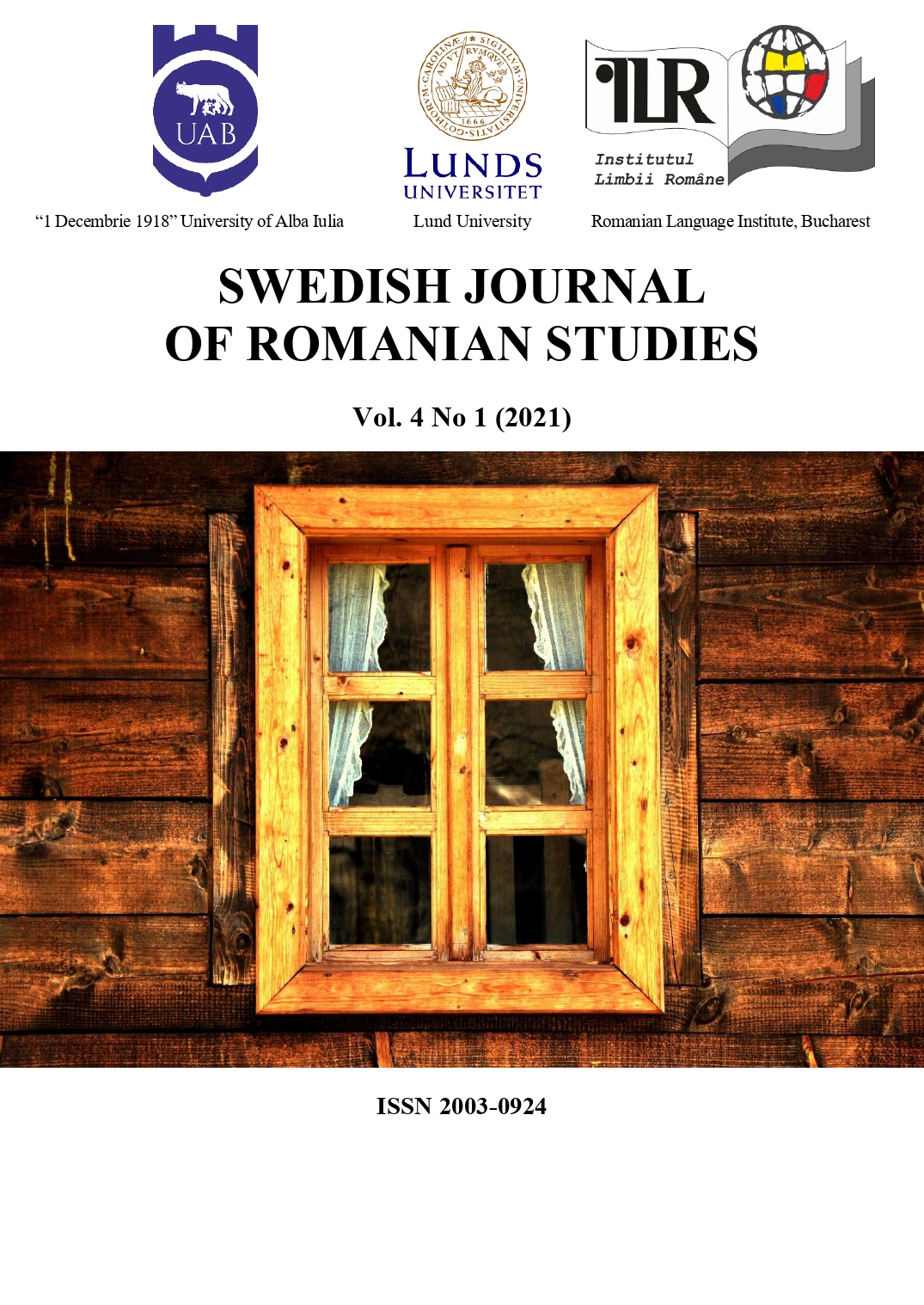Memories from the future: constative and performed identities in ideologized spaces
DOI:
https://doi.org/10.35824/sjrs.v4i1.22420Keywords:
Southeast Europe, communism, post-communism, corruption, authoritarianism, totalitarianismAbstract
Although communism was a Western creation its last consequences were implemented in southeastern Europe. In addition to the imposed aspects, there were local enthusiasms and excesses of zeal (euphemistically speaking), which attest to the existence of an identity matrix and a common mentality. Countries with an authoritarian tradition have absorbed this ideology of simultaneous denationalization and supra-nationalization to the deepest. And after the fall of the Iron Curtain in 1989, the Southeast European space preserved mass nostalgia: Stalin, Tito and Ceausescu are still guardianship figures for many of various social categories. Imperialist stability and/or glory are two of the most important reasons for forgetting communist terror. The research tries to identify and analyze the sources of historical instability that has an impact on the post-communist present - the communist heritage still looming large-, as well as to demystify certain stigmas unconditionally applied to Southeast European civilizations: corruption, laziness, negative Balkanization, frivolity and lack of consistency. This is a selective overview which aims to decant common mentalities of synchrony in relation to diachrony.
References
Abaza, M. (2006). Changing Consumer Cultures of Modern Egypt: Cairo’s Urban Reshaping. Leiden and Boston: Brill. https: //doi.org/10.1017/s0020743808090363
Abercrombie, N. & Longhurst, B. (1998). Audiences. A Sociological Theory of Performance and Imagination. London: SAGE Publications,. https: //doi.org/10.4135/9781446222331
Acton, E. (1986) Russia (The Present and the Past). New York: Longman. https: //doi.org/10.1086/ahr/92.5.1237
Barnett, N. (2006). Tito (Life & Times). London: Haus Publishing London.
Bălănescu, F. (2020). Bălănescu Flori în dialog cu Cristian Troncotă. Securitatea noastră cea de toate zilele/ Flori Bălănescu’s dialogue with Cristian Troncotă. Our Everyday Securitate. Bucureşti: Corint Press,.
Derrida, J. (1977). Of Grammatology. Baltimore: John Hopkins Edition.
Egbert, D. (1 December 1967). “The Idea of ‘Avant-garde’”. In Art and Politics, “The American Historical Review”, Volume 73, Issue 2. Oxford: Oxford University Press.
Halbwachs, M. (2001). On Collective Memory. Minnesota: University of Minnesota Press.
Pavlowitch, S. (2006). Tito: Yugoslavia's Great Dictator: A Reassesment. London: C. Hurst & Co (Publishers) Ltd.
Perrini, M. (1992). “La difficile uscita dal communism dei paesi dell’est Europa”/ “The difficult exit from communism of the south-eastern countries”. In Giornale di Brescia, 5-6 febbraio, 1.
Sanimir, R., Tornquist-Plewa B. (Eds.). (2002). The Balkans in Focus. Cultural Boundaries in Europe. Lund: Nordic Academic Press.
Sampson, S. (2002). “Weak States, Uncivil Societies and Thousands of NGOs. Benevolent Colonialism in the Balkans”. In Sanimir, R. & B. Tornquist-Plewa (Eds.) (2002). The Balkans in Focus. Cultural Boundaries in Europe. Lund: Nordic Academic Press. 27-44.
Velikonja, M. (2008). Titostalgia. A Study of Nostagia for Josip Broz. Ljubljana: Mirovni Institut.
Voloshinov, V. N., Michail M. Bachtin (1986). Marxism and the Philosophy of Language. USA: Harvard University Press.
Wedeen, L. (1999). Ambiguities of Domination. Politics, Rhetoric, and Symbols in Contemporary Syria. USA: University Of Chicago Press. https: //doi.org/10.2307/2586277
Yurchak, A. (2005). Everything Was Forever, until It Was no More. The Last Soviet Generation. USA: Princeton University Press.
Zanić, I. (2002). “South Slav Traditional Culture as a Means to Political Legitimization”. In Sanimir, R. & B. Tornquist-Plewa (Eds.) (2002). The Balkans in Focus. Cultural Boundaries in Europe. Lund: Nordic Academic Press, 45-58.
Links:
Manifesto of the Communist Party, Marxists Internet Archive (marxists.org) 1987, 3. In https: //www.google.ro/url?sa=t&rct=j&q=&esrc=s&source=web&cd=10&cad=rja&uact=8&ved=2ahUKEwi1lOay_MTmAhVIs4sKHSR7Cs8QFjAJegQIAxAC&url=https%3A%2F%2Fwww.marxists.org%2Farchive%2Fmarx%2Fworks%2Fdownload%2Fpdf%2FManifesto.pdf&usg=AOvVaw1cOoPQZtsWyBhlodCPbFZx, accessed November 12, 2019, 19: 52.
The Communist Party members in front of the old prison at Piteşti. In https: //adevarul.ro/locale/pitesti/imagini-revoltatoare-tineri-steaguri-comuniste-fatafostei-inchisori-pitesti-locul-jegurile-anticomuniste-auprimit-pedeapsa-meritata-foto-1_5d83422c892c0bb0c6bdabf3/index.html, accessed January 12, 2021, 23: 15.
Young Romanian historians about communist atrocities: . In https: //www.observatorcultural.ro/articol/istoricul-mihai-demetriade-despre-fenomenul-pitesti-si-dispute-institutionale-in-iiccmer-si-cnsas/, accessed January 12, 2021, 23: 20.
Young Romanian historians about communist atrocities. In https: //www.digi24.ro/stiri/actualitate/scandal-urias-intre-cnsas-si-cercetatorii-madalin-hodor-si-mihai-demetriade-din-cauza-experimentului-pitesti-1209640, accessed January 12, 2021, 23: 25.
Downloads
Published
How to Cite
Issue
Section
License
Copyright (c) 2021 Felix Nicolau

This work is licensed under a Creative Commons Attribution-NonCommercial 4.0 International License.
Authors who publish with this journal agree to the following terms:
a. Authors retain copyright and grant the journal right of first publication with the work simultaneously licensed under a Creative Commons Attribution-NonCommercial 4.0 International License that allows others to share the work with an acknowledgement of the work's authorship and initial publication in this journal.
b. Authors are able to enter into separate, additional contractual arrangements for the non-exclusive distribution of the journal's published version of the work (e.g., post it to an institutional repository or publish it in a book), with an acknowledgement of its initial publication in this journal.
c. Authors are permitted and encouraged to post their work online (e.g., in institutional repositories or on their website) prior to and during the submission process, as it can lead to productive exchanges, as well as earlier and greater citation of published work (See The Effect of Open Access).

